The Business Continuity Imperative: The Digital Experience in Marketing for 2020 and Beyond
Marketing is inextricably linked to business success, and digital technology is essential to an organization’s overall marketing potential because it generates interest and brand awareness. In a black-swan event, the marketing department often is overwhelmed by short-term demands, so in these situations it’s of the essence that digital transformation gets the attention it deserves. In challenging times, a “putting-out-fires” mentality tends to take hold — this is not unreasonable but in focusing on satisfying the interest of the moment, business leaders too often forget that a consistent digital experience is essential to engaging consumers, the public and customers in a way that contributes to long-term success. Fulfilling this objective requires technology designed to deliver for marketing to meet this essential imperative. An organization’s agility and ability to invest adequate time and resources into marketing technology that enables a superior digital experience is essential for its sustainability and operational effectiveness.
Operating under duress during a crisis such as a global pandemic and achieving business continuity is a challenge for any organization’s skillset, particularly if digital transformation investments did not make it to business areas that needed it most. In fact, Ventana Research asserts that through 2021, one-half of organizations will realize that digital transformation investments have not met the organizational readiness requirements of business continuity, leading to a new focus on innovative digital technologies that more reliably sustain operations.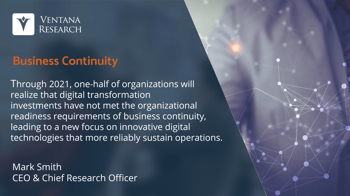
The business continuity imperative requires that marketing organizations make it a priority to examine areas that are often overlooked but that make a meaningful impact on marketing efforts and can contribute to revenue objectives. One such business area is digital experiences— not just content processes but the consumption of that content and interactions across all channels and systems. Managing the digital experience and related processes is not always simple and requires sophisticated and interactive content and conversations. Effective digital engagement requires an experience that provides digital and virtual information that’s consistent no matter the channel, from digital commerce and the company website to the information provided by lines of business across the organization.
It’s critical that organizations provide a digital experience that exceeds expectations, and this requires systems that can provide information that is interactive and responsive. The sustainability of every organization hinges on marketing to invest into modern digital technology investments that make an impact. This, as I have pointed out, is essential to your product experience for buyer and customer delight.
Building Continuity through Digital Experience Marketing
Every organization should start by assessing all short- and long-term efforts related to the digital experience and any approach already in place. No matter where an organization manages digital information and interactions — whether from a dedicated approach such as a digital experience platform (DXP), a content management system (CMS), a marketing or customer data platform (CDP) to a marketing automation platform, or worse, from a tangle of custom applications — it must continuously improve. We assert that by 2022, only one-half of marketing organizations will have transitioned from marketing automation to digital experience marketing that is focused on delivering frictionless interactions across all channels and devices.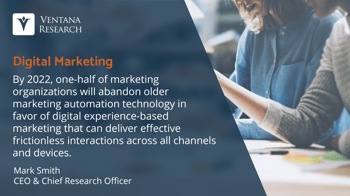
Furthermore, organizations that haven’t yet unified digital experiences by utilizing a cloud-based customer data platform (CDP) must make this an immediate priority. It’s more difficult to readily access customer information when it’s not managed in a unified manner that ensures pleasant, consistent and personalized interactions, especially during times when business continuity is a challenge. It is essential to go beyond conventional wisdom; digital, interactive experiences in the cloud and easy mobile access are basic steps in digital transformation, but this isn’t enough. We have all witnessed the peril of this mindset. Many current approaches lack agility and require significant improvement to support this marketing imperative.
Organizations should cultivate information catalogs and individual profiles by encouraging engagement —through a combination of systems, commerce and websites — to bolster more interactive digital experiences. Doing this requires more automated and streamlined digital processes and conversational, intelligent and interactive virtual experiences. An organization’s investment in its marketing technology will determine its success and this is impossible without high-quality, seamless digital experiences. In fact, Ventana Research asserts that by 2022, one-half of organizations will determine that the digital experiences they provide are not intelligent or automated and fall short in maintaining business continuity for organizational readiness, resulting in lost customers and workforce instability. Marketing organizations must effectively engage their audience and elicit further interactions and build a road towards a brand experience and customer relationship.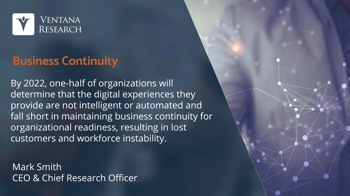
Success is about more than just clicks and interactions; it’s about more than personalization and relevant information, though these things are critical during the best and worst of times, under pressure and over time. Marketing success is about increasing effectiveness and bringing new value to the process itself to gain maximum outcomes.
A clear understanding of digital experience management requires a platform that can manage interactions and content — including profiles and segmentations that are personalized and relevant. This might include promotions or pricing information across B2B and B2C channels. In addition, organizations should seek a platform that enables them to select and configure content based on profiles in a CDP to support digital conversations and interactions. Artificial intelligence and machine learning are critical to automated and effective interactions with audiences. By 2022, more than one-third of marketing organizations will embrace marketing applications that use AI, collaboration and mobile technologies to enhance digital interactions with customers. While a portfolio of marketing 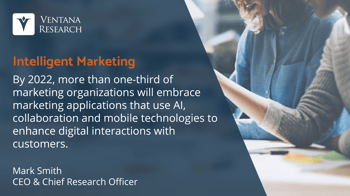 technologies can enhance productivity, organizations should leverage critical metrics for insights that indicate the health of marketing investments and efforts. A portfolio of critical digital experience analytics should include metrics that guide further investment.
technologies can enhance productivity, organizations should leverage critical metrics for insights that indicate the health of marketing investments and efforts. A portfolio of critical digital experience analytics should include metrics that guide further investment.
Optimizing the digital experience is more than just a nicety; it’s essential for every organization that looks to make the most of any visitor or customer that interacts with marketing.
Digital Communications are Essential
Challenges such as a global pandemic or natural disasters demand digital communication across a distributed and virtualized workforce to consumers and customers; however, crises often shift priorities and digital engagement can suffer. Being collaborative and responsive in communications is important and organizations must design an approach that’s comprehensive across all channels and is open and secure to all parties. This is what resiliency and business continuity is all about.
And this is why we assert that by 2022, one-quarter of marketing organizations will deploy conversational experience systems that use AI-enabled natural language for interactions, ushering in a new generation of self-service. Marketing organizations must ensure their digital communications can interoperate with other applications and provide digital experiences that help engage not just those in the workforce directly involved in marketing processes but all parties inside and outside the 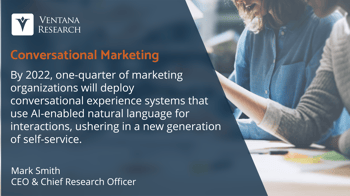 organization. Conversational computing methods such as intelligent virtual agents are smarter than most bots and can enable easy collaboration and rapidly respond to questions and provide information.
organization. Conversational computing methods such as intelligent virtual agents are smarter than most bots and can enable easy collaboration and rapidly respond to questions and provide information.
Engaging an organization in new, virtual ways is essential to enacting workforce management methods that best support the digital experience and related processes. It’s important that an organization rally its work management efforts during a crisis such as a pandemic, because effectiveness in marketing and enhancing digital efforts requires collaboration across the organization to manage the necessary activities and tasks in an intelligent manner. To be effective, organizations should establish best practices and policies that guide improvement to work experiences and enhance virtual interactions across marketing. And marketing organizations must keep this axiom of business continuity in mind: Digital experiences and the required applications and systems must support open and secure digital communications outside of normal operations.
Digital Experiences Matter
Many organizations have managed digital experiences as if it’s traditional content — across an array of systems that focus on content and image uploads — but few of these applications support a dedicated focus on optimizing the experience across a range of interactions and channels. A quality digital experience requires the right technology, which currently we don’t find in traditional marketing automation or content management systems, or even in digital commerce approaches. We assert that by end of 2023, one-half of organizations will conclude they need to replace existing marketing automation technologies for a better digital experience.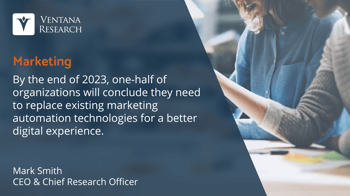
It’s important that an organization make marketing investments that use an automated and intelligent approach to optimize interactions. The current movement in marketing technology is digital experience management, which uses a common platform to enhance the digital, virtual and personalized interactions in B2C or B2B markets. Organizations can integrate anonymized customer profiles with a marketing and customer data platform to better personalize the experience.
Organizations must improve by assessing and prioritizing improvements to optimize engagement and monetize marketing investments. Using the right marketing technology is foundational to success and creates opportunities for breakthrough growth that far exceeds mere automation and productivity improvements. Sustainable results in digital experience platforms are only possible when an organization is deliberate about the marketing technology it uses to increase engagement. Marketing needs to ensure not just one experience and profile, but of intelligently designed segments. Just posting content with an image and description was possible decades ago though it does not provide an effective digital experience. Even worse is the overuse of Adobe Acrobat for publishing information, and we assert through 2023, one-third of marketing organizations will abandon use of Adobe Acrobat for digital content, concluding that the experience fails to meet the needs of mobile-based buyers and customers. Organizations with a unified approach will find that it’s easier to achieve agility when blending modern marketing technologies to create a common profile with which to cultivate conversational and personalized experiences.
Marketing organizations can extend digital potential with extended reality (XR) technology that virtualizes and augments the digital experience, significantly enhancing engagement and often answering questions without wasting the visitor’s or customer’s valuable time by forcing them to interact with a contact center. Embracing methods that use mobile devices to virtualize products and information, whether at a retail location or in a home, can further enhance the digital experience, thus increasing likelihood of engagement that exceeds expectations.
Marketing organizations should be able to capture and monitor interactions and online feedback from all relevant parties to gain the insights necessary to effectively improve the digital experience. Continuous feedback can help increase productivity but, more importantly, the effectiveness of the digital marketing efforts. It might be an opportunity to consider a program focused on the Voice of the Experience (VoX) that formalizes the process to garner digital feedback such as reviews can instill confidence in marketing investments and improve the bottom line.
Smart Investments Matter
Organizations must consider whether investments in marketing applications and technology that support consistently satisfying digital experiences across channels and systems and if they incorporated a conversational and interactive approach.
The right technology includes a platform that supports the portfolio of needs; it must be adaptive and facilitate interactions and integration across the marketing technology stack. Investments should automate processes but they also should facilitate intelligent collaboration and conversations. We assert that through 2023, one-third of organizations will initiate business continuity planning to realign the priority of technology investments 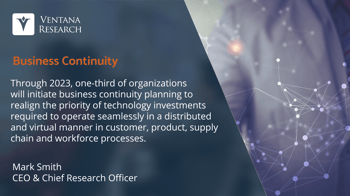 required to operate seamlessly in a distributed and virtual manner in customer, product, supply chain and workforce processes. Marketing organizations should seek investments that enable digital experiences that delight those inside and outside of the organization.
required to operate seamlessly in a distributed and virtual manner in customer, product, supply chain and workforce processes. Marketing organizations should seek investments that enable digital experiences that delight those inside and outside of the organization.
Smart investment requires an effective assessment of an array of applications and tools. A solid evaluation includes the following questions:
- Do your marketing technologies support the configuration and personalization of digital experiences across channels and systems?
- Do you have the marketing processes that optimize experiences and increase engagement?
- Do you effectively gain digital feedback from peer reviews?
- Are you able to track usage and provide metered subscription billing?
- Can you manage your digital catalog of content for targeted segments?
- Are you able to have digital communications across relevant parties in the organization — and to your website’s visitors and customers?
- Can you monitor and engage your marketing experiences in such a way that you can measure and methodically improve?
- Are you able to collaborate on specific work tasks related to subscriptions to improve the quality of information and effectiveness of the experience?
- Are you able to assess digital satisfaction with a VoX program and use feedback to make improvements?
A “no” answer to any of these questions indicates risk that could directly impact an organization’s potential with marketing experience management. Every organization, no matter the industry, the number of its employees or the size, has an opportunity to significantly improve its marketing efforts and the digital experience.
It’s critical that an application enable leaders and managers to adequately plan for and respond to needed changes, from black swan events to meeting typical business continuity obligations. Organizations are unwise to even consider any investments that aren’t mobile-ready and powered with collaboration methods across the workforce. We assert that by 2022, one-third of organizations will determine that their business applications are not 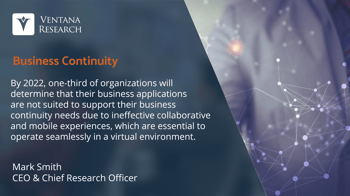 suited to support their business continuity needs due to ineffective collaborative and mobile experiences, which are essential to operate seamlessly in a virtual environment. Every organization must ensure it has technology that can operate on a mobile device and in a remote location, including from the couch and home office. Organizations should be ruthless about any operation that impairs the digital experience. While organizations have spent significant resources and efforts on digital transformation in the form of automation and efficiency improvements, a far more important consideration is whether those investments provide the impact to the work desired and can support this critical focus.
suited to support their business continuity needs due to ineffective collaborative and mobile experiences, which are essential to operate seamlessly in a virtual environment. Every organization must ensure it has technology that can operate on a mobile device and in a remote location, including from the couch and home office. Organizations should be ruthless about any operation that impairs the digital experience. While organizations have spent significant resources and efforts on digital transformation in the form of automation and efficiency improvements, a far more important consideration is whether those investments provide the impact to the work desired and can support this critical focus.
Next Steps
In times of crisis such as the current global health pandemic, when business continuity is a top priority, organizations mustn’t neglect digital investments for marketing , especially if it has not previously been a focal point of executive leadership or a team involved with marketing processes, whether selling or servicing. A superior digital experience demands technology that supports processes that improve productivity and the overall effectiveness of marketing efforts. Leadership that invests in marketing and related technologies can have a profound impact on customer engagement and an organization’s ability to reach expected revenue and financial performance.
Continuous improvement is a the responsibility of CMO, and across business and IT leadership, and impossible to do without marketing designed to optimize the digital experience. It is critical that organizations, especially in times of duress, use business continuity as a driver to improve planning and execution of marketing and related communications and processes, and thus should examine their technology investments.
If you are not sure how to approach improving the digital aspects of marketing — and thus revenue performance — through the lens of business continuity, there are specific steps that every organization should take, similar to the steps outlined in my perspective on the imperative for digital innovation in business continuity. The effective use of digital technologies can reinvent the experience — from the outside in and from the inside out — requiring the right lens that can support business continuity and not distract from it, which can ensure a more comprehensive approach. Most organizations have realized this and are making it a priority to be more prepared. We assert that by 2022, after a decade of concerted efforts in digital transformation, one-half of organizations will not have established business continuity as an investment priority and will not be prepared to operate in a future pandemic or crisis, which will lead to increased operational risks.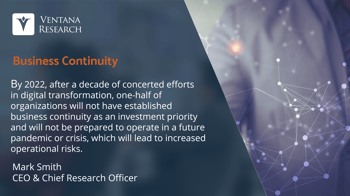
To achieve business continuity, optimize underlying marketing processes and technology for your organization that enhances digital experiences. This can have an immediate impact on top- and bottom-line results. Once your organization has an effective approach to digitally secure and open communications, along with the right tools for digital experiences and leadership committed, you can be assured that your organization is built to last. Ensure that existing and future marketing technology investments are designed for effective engagement and a fantastic digital experience, not just for automation and efficiency.
Every customer matters, as do the internal teams in your organization dedicated to supporting them. The entire executive team — the CEO’s staff, the CMO, CFO, CIO, CCO, COO, CRO, CHRO and the Chief Digital or Innovation Officers— should be aware of the strategy and plans for optimizing marketing processes and digital experiences. Organizational leadership needs to ensure they embrace this imperative and the discipline it entails throughout the organization. The future depends on the active involvement of those who see building sustainable digital experiences as fundamental to business continuity and determining the flexibility to engage and retain every potential customer.
Determining your path forward for 2020 and beyond requires an effective strategy and an understanding of how to best sustain the required business continuity for your organization. Make sure you are using applications and technology for marketing management that can truly provide an effective digital experience that’s focused on engagement and sustainable long-term relationships.
Regards,
Mark

Mark Smith
Partner, Head of Software Research
Mark Smith is the Partner, Head of Software Research at ISG, leading the global market agenda as a subject matter expert in digital business and enterprise software. Mark is a digital technology enthusiast using market research and insights to educate and inspire enterprises, software and service providers.









